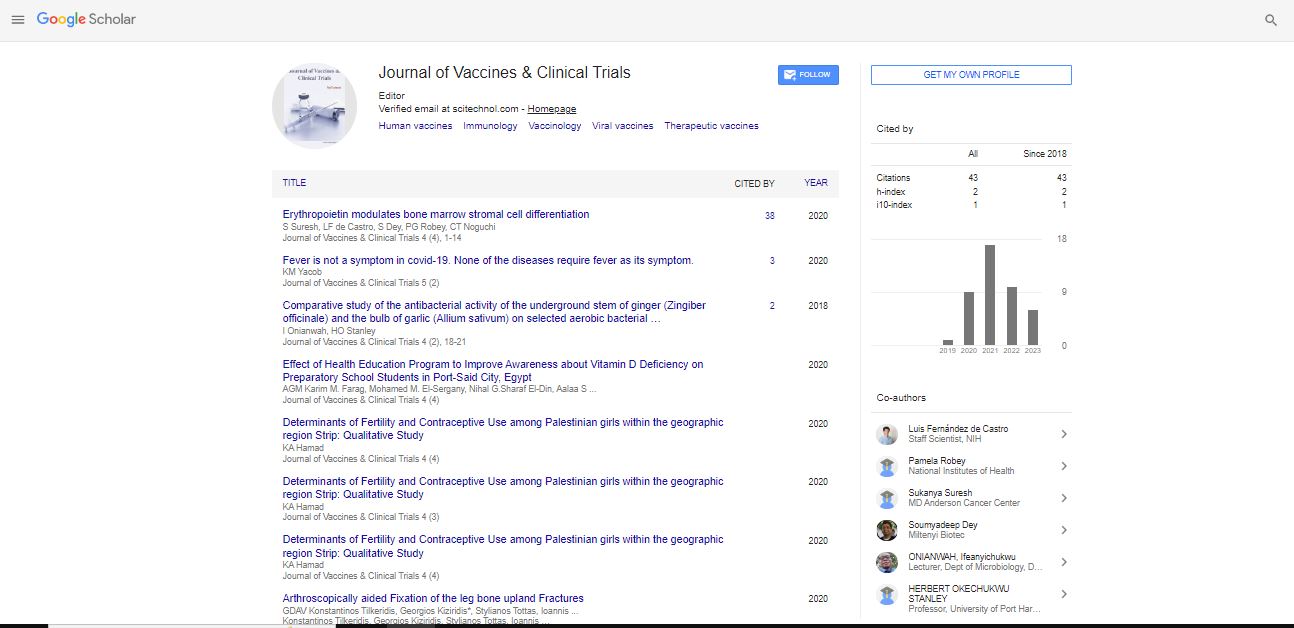Opinion Article, Jou Of Vac Cli Tr Vol: 7 Issue: 1
Immune System: Interactions and Mechanisms of Infectious Agents
Kiley Smith*
1Department of Pathology, Microbiology and Immunology, Vanderbilt University School of Medicine, Nashville, TN, 37232, USA
*Corresponding Author: Kiley Smith
Department of Pathology, Microbiology and
Immunology, Vanderbilt University School of Medicine, Nashville, TN, 37232, USA
E-mail: smithey007@gmail.com
Received date: 24 February, 2023, Manuscript No. JVCT-23-94525;
Editor assigned date: 28 February, 2023, PreQC No. JVCT-23-94525(PQ);
Reviewed date: 13 March, 2023, QCNo JVCT-23-94525;
Revised date: 21 March, 2023, Manuscript No. JVCT-23-94525 (R);
Published date: 30 March, 2023, DOI: 10.4172/JVCT.100066.
Citation: Smith K (2023) Immune System: Interactions and Mechanisms of Infectious Agents. Jou of Vac Cli Tr 7:1.
Description
Immunology is the study of the immune system and its interactions with infectious agents, cancer cells, and other foreign substances. This manuscript explores the basics of immunology, including the different components of the immune system and their functions. We also delve into the complex mechanisms of immune responses and the different types of immunity, including innate and adaptive immunity. Lastly, we discuss the applications of immunology in medicine, including immunotherapy and vaccine development.
The immune system is a complex network of cells, tissues, and organs that work together to protect the body from harmful foreign substances. Immunology is the branch of biology that studies the immune system and its interactions with pathogens, cancer cells, and other foreign substances. The study of immunology has contributed to the development of novel therapeutic approaches and has revolutionized the field of medicine.
Components of the immune system
The immune system is composed of various cells and molecules that work together to protect the body against infectious agents. These include:
• White blood cells: White blood cells, also known as leukocytes, are cells that are involved in the immune response. There are several different types of white blood cells, including B cells, T cells, and natural killer cells.
• Antibodies: Antibodies are proteins that are produced by B cells and are involved in recognizing and neutralizing foreign substances such as viruses and bacteria.
• Complement system: The complement system is a group of proteins that are involved in the destruction of pathogens and other foreign substances.
• Lymphatic system: The lymphatic system is a network of vessels and tissues that is involved in the transport of lymph, a fluid that contains white blood cells and other immune cells.
Mechanisms of immune responses
The immune system has several mechanisms for recognizing and responding to foreign substances, these include:
• Antigen presentation: Antigen-Presenting Cells (APCs) are specialized cells that display pieces of foreign substances, known as antigens, on their surface to T cells. This process allows T cells to recognize and respond to the foreign substance.
• Activation of B cells: When a B cell encounters a foreign substance; it is activated and begins to produce antibodies that are specific to the antigen.
• Activation of T cells: T cells are activated when they recognize foreign antigens displayed on the surface of APCs. Activated T cells can then help B cells produce antibodies or directly attack infected cells.
Types of immunity
The immune system can be divided into two main types of immunity:
• Innate immunity: Innate immunity is the first line of defense against pathogens and other foreign substances. It includes physical barriers such as the skin and mucous membranes, as well as cells such as macrophages and natural killer cells.
• Adaptive immunity: Adaptive immunity is a more specific response that is tailored to a particular pathogen or foreign substance. It involves the production of antibodies by B cells and the activation of T cells.
• Applications of immunology: Immunology has numerous applications in medicine, including the development of vaccines and immunotherapy. Vaccines are a powerful tool for preventing infectious diseases by stimulating the immune system to produce a response to a specific pathogen. Immunotherapy involves the use of the immune system to treat diseases such as cancer. Examples of immunotherapy include the use of checkpoint inhibitors and CAR-T cell therapy.
Conclusion
Immunology is a fascinating field that has greatly expanded our understanding of the immune system and its interactions with infectious agents, cancer cells, and other foreign substances. Advances in immunology have led to the development of novel therapeutic approaches, including vaccines and immunotherapy, which have revolutionized the field of medicine.
 Spanish
Spanish  Chinese
Chinese  Russian
Russian  German
German  French
French  Japanese
Japanese  Portuguese
Portuguese  Hindi
Hindi 